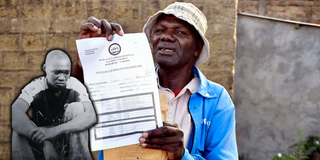Premium
'Tell me who killed my son,' says June 25 protester's father after finally finding body

Joseph Adero, whose son Charles Osewe died at Mama Lucy Kibaki Hospital on June 30, gestures during an interview on September 13, 2024.
"What a painful end!" cried Joseph Obenge Nyangare as he stared at the lifeless body of his son, Charles Osewe Adero.
Charles was one of the young Kenyans who went missing on June 25, when anti-government protests descended into chaos.
For nearly three months, Mr Obenge was a distraught father as Charles' fate swirled in his mind. He hoped against hope that Charles would somehow be found.
As the days turned into weeks, his optimism began to fade.
Then, as he stood over the cold body of his son, Mr Obenge's world collapsed.
"At noon (that day), I received a call that my son was dead and that he was lying in the morgue at Mama Lucy Kibaki Hospital," he said.
One mystery in all this is that he had visited the famous facility earlier but had not been able to locate Charles.
"I have been here five times since the 30th, asking questions. Why couldn't they have told me earlier that the person I was looking for had been here all along? Why keep me in the dark?" he asked.
Another mystery is that his son was alive when he was taken to the hospital.
"I was told he was alive when a policeman brought him in on June 30, but he died before anyone could save him. Can you imagine? He died the same day. Since then it has been a never-ending nightmare. I kept coming here but nobody told me until it was too late," said Mr Obenge, his tone a mixture of anger and grief.
"They (did a fingerprint search) and he was traced back to our rural home. It's the people at home who called me to tell me to look for him at this mortuary.
Speaking of his son with a trembling voice, Mr Obenge recalled the boy who left home with friends on that fateful day, never to return.
"How can someone who got lost in the city during the protest on June 25 be brought here by a police officer from Ruai on June 30 and end up dying here?" he asked.
"He disappeared on the 25th during the protests, but somehow he ended up in Ruai. How? Why? He wasn't even in the place where they recorded him. He wasn't supposed to be there," he said, his frustration evident.
"He left our house, went out with his friends, and then... he just disappeared."
As the chapter of visiting hospitals and morgues and praying to find his son alive ended, another, more difficult chapter began - finding closure.
One side effect of the long search was that he became ill.
"My blood pressure went up. Before I could even go to the mortuary, I had to go to the hospital," said Mr Obenge.
His plight mirrors that of countless others who have suffered similar losses.
"I want to understand how, why. I had three children and now I have two. What has the world become?" he wondered.
During his search, he had also visited police stations, hoping that someone would say they had seen his son. Or that he was being held somewhere. But it was always the same answer - nothing. Until he was told that his lifeless body was in the mortuary.
"My son is no more. How do you move on from that?" asked Mr Obenge.





